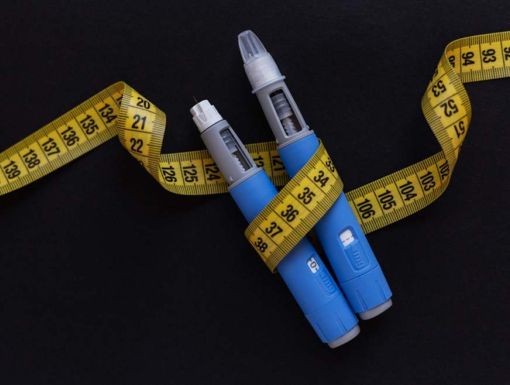
GLP-1 Medications: Benefits, Side Effects and Success Tips
GLP-1 medications, such as Wegovy and Ozempic, have changed obesity treatment, offering hope to millions struggling with weight-related health issues. These medications not only promote significant weight loss but are also linked to lower risks of heart disease, stroke, certain cancers and Alzheimer’s disease.
As these groundbreaking treatments gain popularity, it’s important to understand how to use them effectively for long-term success. With proper guidance and a balanced approach, patients can navigate potential challenges related to use, sustainability, side effects and cost while maximizing the benefits of these life-changing medications.
How do GLP-1 medications work?
GLP-1 medications work by mimicking the natural GLP-1 hormone in the body. This hormone is released in the gut after eating and plays a key role in regulating blood sugar and appetite.
Here’s how they function:
- Stimulating insulin release: GLP-1 drugs trigger the pancreas to release insulin, which helps lower blood sugar by moving glucose from the bloodstream into cells for energy.
- Suppressing glucagon: They reduce the release of glucagon, a hormone that raises blood sugar levels, helping to maintain better glucose control.
- Slowing digestion: These medications delay stomach emptying, which slows the release of sugar into the bloodstream and helps you feel full longer.
- Reducing appetite: GLP-1 drugs act on the brain to decrease hunger, leading to reduced food intake and weight loss.
These combined effects make GLP-1 medications effective for managing Type 2 diabetes and promoting weight loss. However, they are most effective when paired with lifestyle changes like healthy eating and regular exercise.
How do I manage my expectations for GLP-1 medications?
These medications are groundbreaking, but their real-world use comes with complexities. Many patients start GLP-1 therapy expecting a quick fix rather than viewing it as part of a long-term health plan. These unrealistic expectations can prevent the most effective use of the treatment, which requires a partnership with healthcare professionals and lifestyle changes.
Cost and inconsistent insurance coverage also make access difficult. Studies show that most patients stop using GLP-1 medications within two years due to financial challenges, side effects or lack of adequate medical guidance. Stopping these medications without a proper plan can lead to regaining the weight lost and other health risks, highlighting the need for medical supervision.
What are the side effects of GLP-1 medications, such as Ozempic and Wegovy?
Like any treatment, GLP-1 medications can cause side effects. Common ones include:
- Nausea, vomiting, diarrhea and bloating
- Constipation, which can lead to complications, if not managed
- Loss of muscle mass, slowing metabolism and making weight maintenance harder
- Weight cycling, where stopping the medication causes rapid weight gain
Among these, chronic constipation is a persistent issue. If left untreated, it can cause bloating, hemorrhoids or even intestinal blockages. To prevent this, patients should work with their doctor to develop a bowel management plan.
How do I manage side effects of GLP-1 medications?
Those using GLP-1 medications can take steps to maintain gastrointestinal health, including:
- Magnesium glycinate: Helps relax the intestines and ease bowel movements.
- Psyllium husk or flaxseed: Adds fiber to your diet to improve regularity.
- Hydration: Drinking enough water supports digestion and prevents dehydration.
- Stool softeners: Reduce straining and lower the risk of hemorrhoids.
- Smaller, mindful meals: Since these medications slow digestion, overeating can make nausea worse.
These steps not only reduce discomfort but also improve the effectiveness of the medication.
How do I set myself up for long-term success with GLP-1 medications?
One of the biggest challenges with GLP-1 medications is sustainability. The benefits last only as long as the medication is used, and high costs make long-term treatment unrealistic for many. Maintaining weight after stopping the medication requires planning and a commitment to healthy habits.
How can I set realistic expectations for GLP-1 medications?
Patients often feel disappointed — not because the medication fails, but because their expectations were too high. To stay on track, it’s important to:
- Recognize the commitment: GLP-1 medications are a tool, not a cure. Their benefits depend on consistent use and lifestyle changes.
- Plan for a transition: If stopping the medication, work with your doctor to ease off gradually and prevent weight regain.
- Measure progress beyond weight: Track improvements in energy, fitness, and overall health instead of just weight loss.
How do I build healthy habits for lasting results while using GLP-1 medications?
To get the most out of GLP-1 medications, lifestyle changes are essential. Consider:
- Nutrition education: Learn portion control and healthy eating habits. A registered dietitian can help you create a balanced meal plan.
- Strength training: To prevent muscle loss, include weight-bearing exercises in your routine. This helps keep your metabolism strong.
- Daily movement: Even walking 20-30 minutes a day supports weight maintenance and overall health.
- A positive mindset: Focus on progress, not perfection. Small improvements add up over time.
- Support systems: Join a community group, work with a health coach, or talk to a therapist for accountability and motivation.
GLP-1 medications are a powerful tool, but not a standalone solution
GLP-1 receptor agonists are an exciting advancement in obesity treatment. They can help with weight loss and lower the risk of serious health conditions. However, they are not a standalone solution. Long-term success depends on education, lifestyle changes, and medical guidance.
If you’re considering GLP-1 medication, think of it as a step toward a healthier future — not just a quick fix. Work with your doctor to create a plan that includes managing side effects, setting realistic goals and maintaining progress after stopping the medication. With the right approach, these medications can be a powerful tool for improving health, confidence and quality of life.
Learn more about Aldo Russo, MD.



